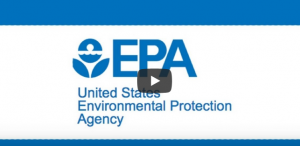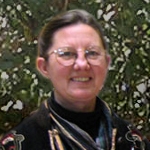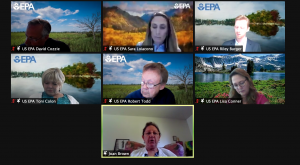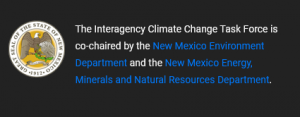Kayley Shoup’s Testimony at EPA Hearing
Kayley Shoup is an organizer for Citizens Caring for the Future, an affiliate of New Mexico Interfaith Power & Light in Carlsbad. Here is her testimony at the EPA hearing on June 15-16, in which the agency is collecting testimony to develop a proposed rule to reduce methane and other harmful pollutants from new and existing sources in the oil and natural gas industry.
I don’t need to tell all of you what climate goals stricter methane rules and stronger enforcement will help us achieve. You know why we must cut methane emissions…These rules could mean that a mother doesn’t have to watch her child go through leukemia. They could mean that a young man doesn’t lose his hardworking father at a young age. They could mean that a grandmother can breathe easy into her old age. They could mean that a young couples dream of a family isn’t dashed by reproductive issues.
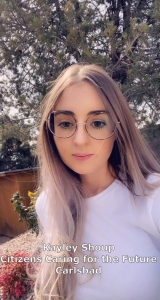 Just last week I was out in the oil fields of the Permian with Earthworks looking for emission events. It was upwards of 105 degrees every single day. Prior heat records were being broken. It was something else to quite literally be feeling the effects of climate change, while also seeing through a FLIR video camera the emissions that are significantly contributing to that climate change. It was memorable to say the least.
Just last week I was out in the oil fields of the Permian with Earthworks looking for emission events. It was upwards of 105 degrees every single day. Prior heat records were being broken. It was something else to quite literally be feeling the effects of climate change, while also seeing through a FLIR video camera the emissions that are significantly contributing to that climate change. It was memorable to say the least.
As I drove home from the oil fields each night last week, I thought about how scared I was that my community is breathing the emissions I had just seen into our lungs every single day. I thought about how so few people in my tiny hometown realize what danger our health is in. The risks are not communicated by industry or the agencies that are supposed to protect us. I thought about the oilfield workers who are directly exposed to this pollution every single day, and how their lives may be upended by disease in the future. I thought about how many emissions events I had seen in just one day, and then I would shudder remembering that there is only one air monitor in my town, and that there are no air inspectors in New Mexico that live in the Permian. I thought about how cancer runs in my family, and how the pollution I’m exposed to may assure that I die young. I thought about my 51 year old mother who has just finished treatment for ovarian cancer, and how terrified I am that pollution could contribute to the recurrence of her cancer. I thought about how everyday I am learning that my community is a sacrifice zone.
I naively thought that I was being protected by federal and state environmental agencies. I blindly trusted my government and I blindly trusted industry, but sometimes the truth slaps you in the face and wakes you up. I am involved today because living in a frontline community has woken me up to the fact that some communities, some families, some human beings really are seen as disposable. I’ve seen firsthand a culture that values the state of the economy more than a child’s life. I realized something was wrong when I pieced together that I knew more young people with rare and aggressive cancers than the total number of people my eighty year old grandmother has known throughout her life that had cancer. Since beginning. This is reality for young people on the front lines. Whether or not they realize that the devastation they face in their life could very well be attributed to pollution caused by emissions does not change the fact that the devastation exists.
I don’t need to tell all of you what climate goals stricter methane rules and stronger enforcement will help us achieve. You know why we must cut methane emissions. I don’t need to explain why we need to diversify our economy, or how cutting methane provides job creation. I do need to remind you of this though. These rules are more than just rules. These rules could mean that a mother doesn’t have to watch her child go through leukemia. They could mean that a young man doesn’t lose his hardworking father at a young age. They could mean that a grandmother can breathe easy into her old age. They could mean that a young couples dream of a family isn’t dashed by reproductive issues.
Frontline communities suffer the most when common sense action isn’t taken, but because of climate change everyone in the world is essentially living in a sacrifice zone in one way or another. Whether their community is constantly threatened by natural disaster or riddled with disease. Methane emissions affect us all. I hope the EPA chooses to take bold and swift action to make methane rules that sustain life.

